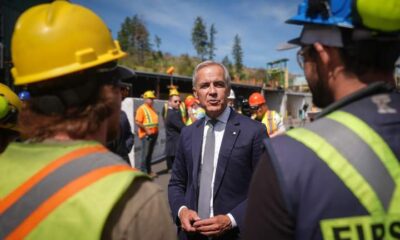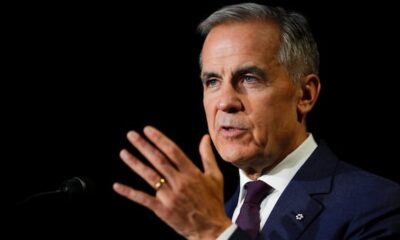Top Stories
Ottawa Unveils $22M Clean Energy Boost for Nunatsiavut Today

UPDATE: Ottawa has just announced a major investment of nearly $22 million in clean energy initiatives for Nunatsiavut, aimed at drastically reducing fossil fuel reliance. The announcement, made by Federal Minister of Crown-Indigenous Relations Rebecca Alty in Happy Valley-Goose Bay earlier today, marks a significant step towards sustainable energy solutions in this northern region.
The funding will support three key projects: a wind micro-grid in Nain, tidal energy assessments near Rigolet, and solar panel installations across multiple community centers. These initiatives come as part of Nunatsiavut’s climate adaptation strategy, reinforcing the region’s leadership in combating climate change.
“The Inuit leadership in the Nunatsiavut region have been climate leaders,” Alty stated, emphasizing the importance of local solutions to address the climate crisis. The Nain wind project will introduce two 1.5-megawatt turbines, projected to cut diesel consumption by up to 1.6 million liters annually, significantly reducing greenhouse gas emissions in the area.
The tidal energy initiative aims to gather crucial data on local currents, paving the way for potential future energy generation. “There’s incredible tidal energy potential,” Alty noted, indicating that the government is keen to explore more renewable options in the North.
Additionally, solar energy investments will enhance community centers in Nain, Rigolet, Postville, and Hopedale, alongside the Makkovik arena solar project. This comprehensive approach not only addresses energy needs but also promotes economic development through sustainable practices.
The federal government is closely monitoring these projects, with plans to replicate successful models in other northern communities across Canada. “It’s great to see more projects in the North being able to displace or completely eliminate diesel,” Alty added, highlighting the broader implications for energy independence.
Inuit Tapiriit Kanatami President Natan Obed praised the funding as a vital move towards equity and partnership between the Canadian government and Indigenous peoples. “We continue to see progress towards equity, towards the true partnership between the government of Canada and Indigenous rights-holding peoples,” Obed stated.
As climate change continues to threaten the landscape of Labrador, these initiatives represent a proactive response to environmental challenges. The Nunatsiavut region is witnessing dramatic shifts, including diminishing sea ice, making this funding even more urgent.
This funding announcement is not just about energy; it is about community resilience and a sustainable future for Indigenous peoples in Canada. With the potential to serve as a blueprint for other regions, these projects could herald a new era of clean energy across northern Canada.
Stay tuned for further updates as these transformative projects unfold, and follow us for more critical news as it develops.
-

 Politics3 weeks ago
Politics3 weeks agoSecwepemc First Nation Seeks Aboriginal Title Over Kamloops Area
-

 World4 months ago
World4 months agoScientists Unearth Ancient Antarctic Ice to Unlock Climate Secrets
-

 Entertainment5 months ago
Entertainment5 months agoTrump and McCormick to Announce $70 Billion Energy Investments
-

 Lifestyle4 months ago
Lifestyle4 months agoTransLink Launches Food Truck Program to Boost Revenue in Vancouver
-

 Science5 months ago
Science5 months agoFour Astronauts Return to Earth After International Space Station Mission
-

 Technology3 months ago
Technology3 months agoApple Notes Enhances Functionality with Markdown Support in macOS 26
-

 Top Stories2 months ago
Top Stories2 months agoUrgent Update: Fatal Crash on Highway 99 Claims Life of Pitt Meadows Man
-

 Lifestyle3 months ago
Lifestyle3 months agoManitoba’s Burger Champion Shines Again Amid Dining Innovations
-

 Sports5 months ago
Sports5 months agoSearch Underway for Missing Hunter Amid Hokkaido Bear Emergency
-

 Politics4 months ago
Politics4 months agoUkrainian Tennis Star Elina Svitolina Faces Death Threats Online
-

 Politics4 months ago
Politics4 months agoCarney Engages First Nations Leaders at Development Law Summit
-

 Technology5 months ago
Technology5 months agoFrosthaven Launches Early Access on July 31, 2025





















